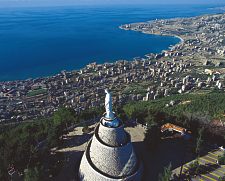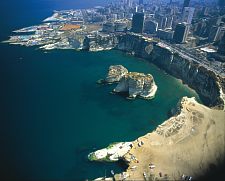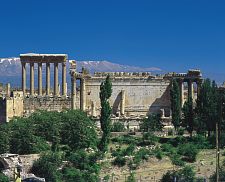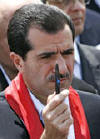|





| |
Terrorism hits Lebanon 15 times in 1 year
CDL | September 25, 2005
The 2005 Lebanon bombings were a series of bombings that occurred mainly in
Beirut, Lebanon and its suburbs. While the current wave of bombings began in
October 2004, the assassination of former Prime Minister Rafiq Hariri on
February 14, 2005, touched off the Cedar revolution and the withdrawal of Syrian
troops. After the massive protests following Hariri's killing, several more
bombings hit Lebanon, following a similar pattern: most of them occurred at
night, in Christian areas of the country, and often on Fridays. Though the
perpetrators behind the bombings are unknown, suspicion by some within Lebanon
and the international community has fallen on Syria or its supporters.
Contents
1
The Bombings
1.1 Marwan Hamadeh assassination attempt
1.2 Rafiq Hariri assassination
1.3 New Jdeideh bombing
1.4 Kaslik bombing
1.5 Sad el-Bouchrieh bombing
1.6 Broummana bombing
1.7 Jounieh bombing
1.8 Samir Kassir assassination
1.9 George Hawi assassination
1.10 Elias Murr assassination attempt
1.11 Monot bombing
1.12 Zalka bombing
1.13
Jeitawi bombing
1.14 May Chidiac attempt
1.15
Gebran Tueini assassination
The Bombings
Marwan Hamadeh
assassination attempt
On October 1, 2004, a car bomb exploded next to the motorcade carrying Druze MP
Marwan Hamadeh. Hamadeh was injured, but survived; his driver was killed.
Hamadeh had been a critic of Syria and was a member of the opposition to
President Emile Lahoud.
Rafiq Hariri assassination
A massive explosion on February 14, 2005, killed former Lebanese Prime Minister
Rafiq Hariri in Beirut, near the St. George Hotel. Also killed was the former
Minister of the Economy, Bassel Fleihan, and 19 other people. About 220 others
were wounded.
A group calling itself "The Nasra & Jihad Group in Greater Syria" claimed
responsibility for the blast. The group had not been heard from before. A tape
aired by Al-Jazeera showed a bearded man, believed to be a Palestinian named
Ahmad Abu Adas, claiming the attack. Adas' apartment was raided but he remains
missing.
A United Nations investigation into the bombing concluded that the blast was the
result of a truck bomb; a security camera showed a white Mitsubishi truck
driving near Hariri's convoy moments before the blast. The U.N. team has not yet
determined whether the explosives were detonated remotely or by a suicide
bomber; however, since Hariri's convoy had jamming devices meant to block remote
control signals, a suicide bomber was considered a strong possibility.
On August 30, 2005, four pro-Syrian generals were arrested in connection with
the attack. They are being questioned by members of the U.N. team and Lebanese
officials.
New Jdeideh bombing
A car bomb exploded in the New Jdeideh suburb of Beirut on March 19, 2005. The
blast happened in a part-commercial, part-residential area, and wounded eleven
people. Reports said that the driver had tried to park it in front of a bingo
hall, and was turned away, so he parked it next to an apartment.
Kaslik bombing
On March 23, a bomb left in a leather bag exploded at the back entrance of the
Kaslik shopping center in Beirut. Three janitors, two Indians and a Pakistani,
were killed, and two Sri Lankans and two Lebanese were injured. The roof of the
mall collapsed.
Sad el-Bouchrieh bombing
A car bomb parked between two factories exploded in the Sad el-Bouchrieh area of
Beirut, wounding six people. It caused a blaze which destroyed several
workshops.
Broummana bombing
On April 1, a bomb ripped through the Rizk plaza in the Broummana resort
village, 20km (13 miles) east of Beirut.Twelve people were injured.
Jounieh bombing
On May 6, a car bomb exploded between the Christian Sawt al Mahaba radio station
and the Mar Yuhanna Church in Jounieh. The radio station was destroyed and the
church suffered major damage. At least 22 people were wounded.
Samir Kassir assassination
Anti-Syrian journalist Samir Kassir was assassinated on June 2 when a bomb
detonated in his car outside his home in Beirut's Ashrafiyeh district, a largely
Christian residential area. Kassir was a front-page columnist for the al-Nahar
newspaper, where he wrote columns criticizing the pro-Syrian regime.
George Hawi assassination
George Hawi, former Lebanese Communist Party leader and a critic of Syria, died
when his car exploded as he was driving through Beirut's Wata Musaitbi district
on June 21.
Elias Murr
assassination attempt
A car bomb wounded the outgoing Lebanese defense minister, Elias Murr, as his
motorcade drove through Beirut's Christian suburb of Antelias on July 12. Two
people were killed and several others were injured. This attack was unique in
the series of bombings in that Murr was considered a pro-Syrian figure.
Monot bombing
On July 22, a bomb exploded in a car parked in front of a restaurant on Monot
Street in Beirut, wounding twelve people. The bomb was estimated to be 50 lbs.
Zalka bombing
In the mostly Christian neighborhood of Zalka, on August 22, a bomb placed
between a shopping center and a hotel damaged shops and windows, wounding eight
people. It consisted of 20 to 30 kg of TNT and was set on a timer.
Jeitawi bombing
An explosion, believed caused by a car bomb, rocked the largely Christian area
of Ashrafieh on September 16. One person was killed and 23 injured. Two cars
were blown up and buildings near the blast were severely damaged.
May Chidiac attempt
Christian journalist and critic of Syria May Chidiac was seriously injured when
a bomb exploded as she got into her car in Jounieh on September 25. She lost her
left leg and arm. Chidiac was a anchor on the Lebanese Broadcasting Corporation.
Gebran Tueini assassination
Christian journalist, Director and CEO of Annahar Newspaper, Member of
Parliament and an outspoken critic of Syria's 30-year occupation of Lebanon and
continuous meddling in Lebanese affairs, Gebran Tueini was assassinated on
Monday December 12, 2005 in a massive car explosion in Mkalles, east of Beirut.
Tueini was one of the leaders of the independence uprising in Beirut that led to
the March 14th demonstration and the withdrawal of Syrian troops from Lebanon.
Read
more...
Un mort et 22 blessés dans un attentat nocturne à Jeitaoui
Achrafieh, cible des terroristes pour la
deuxième fois
Beirut - 17 Septembre 2005
Un mort et 22 blessés : tel était, à l’heure de mettre sous presse, le
premier bilan de l’explosion qui a touché à minuit la rue Chahrouri, dans le
secteur de Jeitaoui, non loin de la Banque Byblos, à Achrafieh. L’attentat, dont
la déflagration a été entendue dans des localités relativement éloignées de ce
secteur de la capitale, a fait d’énormes dégâts matériels.
Hier, peu après l’explosion, plus rien ne pouvait contenir la rage des habitants
d’Achrafieh, spécialement ceux qui habitent la zone touchée par l’explosion.
Plusieurs altercations ont éclaté entre les habitants et l’armée et
d’importantes bousculades ont opposé par intermittence les civils aux militaires.
Les habitants d’Achrafieh ont senti un « tremblement terre » ou ont cru à un «
raid aérien »…C’était encore une autre explosion, la deuxième qui touche le
quartier depuis la série d’attentats contre les zones résidentielles chrétiennes,
et c’est peut-être l’une des plus importantes en matière de pertes humaines et
de dégâts matériels.
Plusieurs immeubles ont été gravement touchés par l’explosion : leurs façades
ont été soufflées, les rideaux métalliques des garages ont été éventrés, les
portes des appartements ont volé en éclats.
Il faut également compter les dizaines de voitures qui ont été endommagées et la
destruction qui a frappé l’intérieur des appartements.
L’explosion a coûté la vie à Haig Sebomanian, âgé de 90 ans. Parmi les blessés
identifiés, Sleiman Assad, Dima et Thérèse Saykali, Rafic Madani, Souad Younès,
Michel et Makram Nakhoul, Manal Sahraoui, Liliane Tohmé, Rica Nachanatian et ses
deux filles Eva et Antoinette, Jamil Hamzé, Lina Baaklini, Joseph Bachaalani,
ainsi qu’une ressortissante sri-lankaise.
Peu d’informations ont été fournies à la presse sur le poids et l’emplacement de
la charge explosive. Selon l’AFP, qui a cité des sources de sécurité, cette
dernière pesait entre 10 et 20 kilogrammes et elle était placée dans la cage
d’escaliers d’un immeuble. Selon d’autres informations, il s’agirait d’une
voiture piégée.
Des témoins ont rapporté qu’une voiture aurait fait plusieurs tours dans le
quartier avant que son chauffeur décide de la garer sur un trottoir faisant face
à l’entrée d’un bâtiment. Le chauffeur serait descendu du véhicule peu avant
l’explosion.
Certains observateurs n’ont pas manqué de lier l’explosion d’Achrafieh à la
conférence faite au cours de la journée par le PSNS, rendant hommage aux
assassins de Béchir Gemayel.
La colère régnait dans la nuit dans les rues de ce secteur de la capitale,
surtout que les personnes accourues aux nouvelles n’ont pas eu le droit de voir
leurs proches restés dans les immeubles touchés, l’armée ayant complètement
bouclé le secteur.
« Mes parents sont toujours dans l’appartement, ils ne peuvent pas quitter la
maison parce que la porte a été défoncée. Ils vont bien, j’ai pu leur parler au
téléphone », indique une jeune femme venue de Hazmieh. Empêché de voir sa
famille, un jeune décide d’envoyer la Croix-Rouge dans l’un des appartements. «
Mon père est diabétique », explique-t-il.
Mais d’autres, beaucoup d’autres, n’avaient pas ce sang-froid ou cette présence
d’esprit. Nerveux et insécurisés, ils n’ont pas hésité à faire éclater leur
rage. « Ma mère est en haut, elle a 80 ans. Je veux la voir. Otez-vous de mon
chemin, vous êtes incapables de nous protéger », a lancé un quadragénaire à la
tête d’un officier. Il n’était pas le seul à avoir ce genre de réactions, loin
de là.
D’autres, à bout de nerf, ont agi autrement : un homme s’est évanoui sur la
chaussée en constatant l’ampleur des dégâts. Une femme, âgée d’une soixantaine
d’années, en chemise de nuit, debout devant la façade soufflée de l’immeuble
qu’elle habite, éclate en sanglots : « Je croyais que c’était fini »,
répète-t-elle comme une automate.
Patricia KHODER
Gebran
Tueni Perishes in Massive Car Bomb Explosion Near Beirut
 Gebran
Tueni, a fiery critic of Syria, was assassinated in a car-bomb explosion in
Mkalles, east of Beirut Monday. He was 48. Gebran
Tueni, a fiery critic of Syria, was assassinated in a car-bomb explosion in
Mkalles, east of Beirut Monday. He was 48.
Tueni was An Nahar's general manager and Beirut legislator.
A parked car packed with an estimated 100 kilograms of TNT exploded at 9 am as
Tueni's motorcade passed in the hilly industrial suburb of Mkalles, flinging his
armor-plated vehicle and several other cars into a ravine. Tueni, his driver and
his bodyguard were killed. Another 30 people were wounded in the bombing, which
shattered nearby store windows and started a fire that destroyed at least 10
vehicles
"This is a new terrorism message," anti-Syrian leader Walid Jumblat said of the
killing, which follows a series of subsequent bombings that have targeted mainly
anti-Syrian officials in the past year.

Telecommunications Minister Marwan Hamadeh, who is also Gebran's uncle,
threatened to resign if the cabinet did not meet by Monday evening "to demand an
inquiry under the supervision of the Security Council on all the crimes
committed by Syria."
Hamadeh was also targeted on October 1, 2004 in a failed assassination attempt
by the Syrian intelligence services in Lebanon.
Speaker Berri described Tueni as a "voice that shouted in the wilderness of a
nation against oppression."
An outspoken critic of Syria's role in Lebanon, Tueni had just returned from
France where he had been living for fear of assassination. His columns in An-Nahar
often raised the ire of the Syrians.
After ex-Premier Rafik Hariri's assassination, Tueni played a prominent role in
the leadership of the mass demonstrations that, combined with international
pressure, succeeded in forcing Syria to withdraw its troops from Lebanon in
April, ending a 29-year hegemony. He was elected to parliament for the first
time in the last elections in June.
Tueni's grandfather, Gebran Tueni, founded An-Nahar. His father Ghassan Tueni is
considered the dean of the Lebanese press, having turned the newspaper into one
of the leading media institutions in the Arab world.
In his final days, Tueni was campaigning for an international probe into
recently discovered mass graves near the Defense Ministry in Yarze and Anjar
which he blamed on the Syrians.
In his last editorial published Dec. 8, Tueni accused Syria of committing
"crimes against humanity" in Lebanon. He charged the Syrian leadership with
"trying to turn the clock back" and to intimidate the Lebanese.
He is survived by his wife, Siham Asseily and his four daughters Nayla,
Michelle, from a previous marriage, and twin infants Gabriella and Nadia.
|